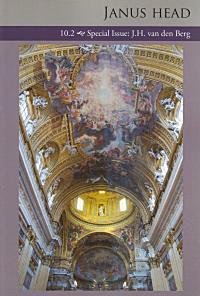 Janus Head Janus Head
10.2
Special Issue
J.H. van den Berg

Beyond Time
New & Selected Work
1977 - 2007
Robert Gibbons
 The Age of Briggs & Stratton The Age of Briggs & Stratton
Peter Culley
|

Wind from the Sea
(1948)
Andrew Wyeth
(July 12, 1917 – January 16, 2009)
_______________________
Homage To Georges Perec
An Entertainment in Six Univocalisms
Several unpublished oulipian texts by Perec's English translator Ian Monk.
4. Downtown
To do or not to do: Gods, how to opt?
For who knows good from wrong, or wrong from good;
who'd follow forlorn lords, bow down to clods,
stoop to Sodom, boom songs of so long loss,
or dog coxcombs, hobnob to hollow loons;
who'd down hootch, long for boons Gods know not of;
who'd drool onto dons, for whom tomfools blot
drops onto books, or low words (how now brown cow?);
who'd smooth wrongs, mock worlds from top to bottom,
or crow to crowds for blood; who'd doctor horrors,
or woo doom's pogroms, Lot's loss, Bloom's sorrows,
or woof of wolf or woof of Clotho's loom?
So do not! Good's soon wrong, wrong's soon good for
tomorrow, tomorrow, for tomorrow.
ebr10 - writing under constraint winter 1999/2000
_______________________

Hyeres
Jaap Scheeren
via The Exposure Project
_______________________
Fictions of Globalization:
Narrative in the Age of Electronic Media
Paul A. Harris
PhiN 7/1999
...attempts to look at two intricately related developments: the historical and cultural processes which have gained currency under the term 'globalization' and the changing role of literature in a culture more and more defined by computers. The main focus will be on different "fictions of globalization", that is fictions on the one hand that depict or exemplify specific aspects of the cultural condition we evoke with the word globalization, but also, on the other hand, fictions which belong to globalization because they are created by and symptomatic of the forces that drive gobalization. (....)To think of narrative as a tuning device is on one level just another way of saying that it is a way we make sense of the world. However, the changing conditions of both our culture and planet make different demands on our minds, so the process and level of sense-making shifts accordingly. Narrative no longer seems to work by imposing the telos of plot on the contingencies of the world, but by sifting through dispersed bits of discrete input and rendering them intelligible and coherent. In the final analysis, this process of narrative tuning ultimately functions on a global, anthropological and even visionary level - narrative ultimately becomes a tuning in to the world which rediscovers and reestablishes our place, our home in it....(more)
PhiN: Philologie im Netz
a journal for linguistics, literary, and cultural studies
_______________________
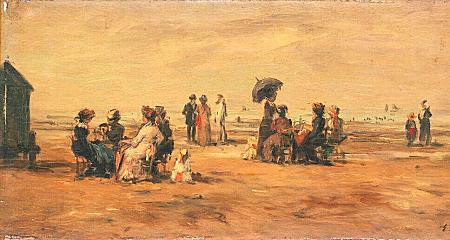
Eugène Boudin
b. 12 July 1824
_______________________
Shorter American Memory
Rosemarie Waldrop
(1988)
ubu Editions
"All Americans are also ambiguous. In 1937, Henry Beston assembled and edited an anthology of various historic sources titled American Memory: Being a Mirror of the Stirring and Picturesque Past of Americans and the American Nation. The gist: to weave historical documents together to 'evoke the emotions and motives of those who made our memory.' From this commonplace histrionic babble, Rosmarie Waldrop crafts her delicious comic critique, Shorter American Memory. Originally published in 1988 by paradigm press (a year after The Reproduction of Profiles, Waldrop's stunning reworking of Wittgenstein's Philosophical Investigations) Shorter American Memory applies a playful array of abbreviating manipulations to Beston's collection. Unlike Waldrop's more familiar signature of mixed original composition and embedded citation, Shorter American Memory is strict detournement‹the entire work consists of politically subverted, procedurally reprocessed fragments from the hegemonic narrative of American Memory. The twenty-two prose-poem revisions fall between disjunctive textual synthesis and nuanced hypotactic collage. Hear Waldrop read selections of Shorter American Memory at PENNsound here, or enjoy a small sample: We holler these trysts to be self exiled that all manatees are credited equi distant, that they are endured by their Creditor with cervical unanswerable rims, that among these are lightning, lice, and the pushcart of harakiri."
_______________________
From a Notebook 11/9/54 (1954)
Robert Duncan
The false and the true! The false and the true! These are the very veins of poetic stuff; poetry which runs all false and true. And the poet quickens his sense to distinguish the not-false from the precious false, the not-true from the precious true: like a hunter quickening his sense to his prey, or a miner to mock gold or to gold.
It is the heightened sense of the true and the false, the — even confused or confusing — involvement with the qualities of meaning and not meaning, the adherence to the necessities of speech, as a medium, the dwelling in poetry that I love. This is, wherever and however I find it, of my kind.
(....)
... we speak of a poetry in painting and of a poetics of music for the verb poein means to make. The mystery of making. The Saxon word for the poet was makaris.
It is from this point that we may see perhaps why all verse is not poetry; why often complete works in prose — Moby Dick and Remembrance of Things Past or then Ulysses of Joyce certainly come to mind — are major works in a poetics. Because these works — whatever they have to do with the world of experiences and emotions — demand, if we are to dwell in them, to love them, that we enter the world of their making. And we realize that this is a world that came into being by the necessities of the work, in the mysteries of the making. Then we say — as for instance of Schönberg’s Serenade or of Matisse’s windows at Venice . . . but there are fields of these events, like flowers . . . that the artist is inspired. We mean then that for all the labors and contemplations of the artist something other than labor and contemplation come into play, for whatever his message, something more beautiful than message — a vitality, a liveliness, an urgency in the work itself — moved toward fulfillment....(more)
Ten Prose Pieces, 1945 to 1978
Robert Duncan jacket
_______________________
A selection from
The Unbearable Lightness of Blogging:
the Mid-Summer Night's Masque
Nick Piombino
Laura Riding: “How we happen to be both human,
of the material of the machine…
The one original substance is one.
Two is two’s destruction.
But love is the single word wherein
The double murder of the machine
Is denied
In one suicide…”
(....)
Walter Benjamin: "Warmth is ebbing from things.
The objects of daily use gently but insistently
repel us."
(....)
Walter Benjamin: "The work is a death
mask of its conception." _______________________
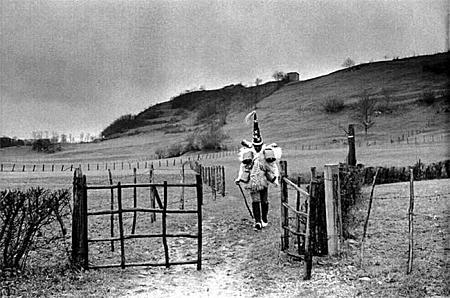
Peliqueiro in Cantabria
Cristina Garcia Rodero
1993 1 2 3 The Sacred and the Profane of Spanish Carnaval
Alan Weisman
_______________________
Going walkabout (well drive-about really).
I'll be away from the 'puter for a few days - mw
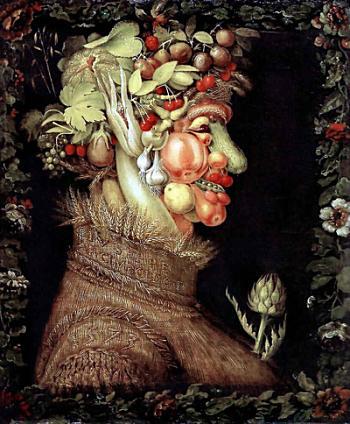
summer
Giuseppe Arcimboldo
1527 - 1593
_______________________
Divestiture - A
Bruce Andrews
ubu editions
The choice: to be a catalog, or a cataloguer. Such examples can be multiplied. I only collect money, America is more astonishing. Husk. Cataloging phrasal fragments and reconfiguring verbal shells, Divestiture—A continues Andrews' method of anasemantic editorial composition begun in the mid-eighties: a montage of heterogeneous constellations of words culled from vast collections of textual material jotted down over time. We see only the feet of the dancers, the de-socializing of language, never their whole bodies. As editing is the reading moment: the multimplication of material in Divestiture—A yields a thresholding surplus, a hyper-trophy of enjoyments: its post-personalizing thrill bursting from an energizing strangeness of interferences, interruptions, and diastrophic collisions. Now, even the lacunae are eloquent—plausible verbal models are quite easy to formulate. The unlikely pairing of radically disjunctive contexts and syntactically coherent prose (preminiscent of spambot computational processing) is formed precisely in the affirmation of rupture & divestiture. To understand too much is to destroy: the containers are distorters inevitably. The horizon-value of Divestiture—A emphasizes a political economy of full textual dissemination: Andrews cedes the original contexts of the collected material and relinquishes authorial control over illusory semantic value—in its place: the ecstatic pleasures of egalitarian exchange and productive reader-editor dialogue. The sounds are not enough—'no address,' 'in distress.' Language speaks for itself. … I hate dealing with messages that may not have been intentionally transmitted delicacies of randomness.
_______________________
fen again wakes
a hymn to jim
Suzanne Nixon
for it’s sogging about
in the bog you go
and who was to know
that so much of the stuff
that lay buried below
was treasure
and didn’t you take a dive right on in
through the prickles of gorse
to the tickles, of course;
buried about and within
oh fiddle-dee-dedalus
not one afraidalus
just a bit crazaelus
building a mazealus
all from the treasure within within
all from the treasure within
from the mire and the muck,
from the swamp of myth’s history;
of Moll’s glorious fuck
and Leopold’s pisstory
all of it gristory
for the milling of tale
so he churned and he spaded
the fen of his mind;
...(more)
FlashPoint - Summer 2009
A Multidisciplinary Journal in the Arts and Politics
_______________________
"...in the course of my life I have always found somewhere the necessary support, the formula which had been waiting for me not in order to be petrified in my words but in order to explain me to myself."
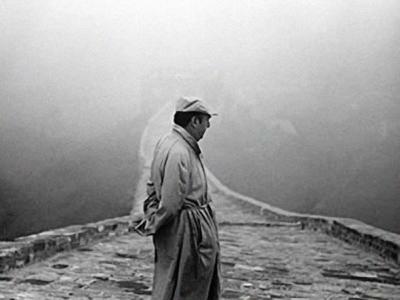
Pablo Neruda
July 12, 1904 - September 23, 1973
_______________________
Love For This Book
Pablo Neruda
Translated by Clark Zlotchew and Dennis Maloney
What do we leave here but the lost cry
of the seabird, in the sand of winter, in the gusts of wind
that cut our faces and kept us
erect in the light of purity,
as in the heart of an illustrious star?
(....)
We asked the ocean for its rose,
its open star, its bitter contact,
and to the overburdened, to the fellow human being, to the wounded
we gave the freedom gathered in the wind.
It's late now. Perhaps
it was only a long day the color of honey and blue,
perhaps only a night, like the eyelid
of a grave look that encompassed
the measure of the sea that surrounded us,
and in this territory we found only a kiss,
only ungraspable love that will remain here
wandering among the sea foam and roots.
...(more)
_______________________
Ode to the Book
Pablo Neruda
translated by Nathaniel Tarn
When I close a book
I open life.
I hear
faltering cries
among harbours.
Copper ignots
slide down sand-pits
to Tocopilla.
Night time.
Among the islands
our ocean
throbs with fish,
touches the feet, the thighs,
the chalk ribs
of my country.
The whole of night
clings to its shores, by dawn
it wakes up singing
as if it had excited a guitar.
The ocean's surge is calling.
(....)
No book has been able
to wrap me in paper,
to fill me up
with typography,
with heavenly imprints
or was ever able
to bind my eyes,
I come out of books to people orchards
with the hoarse family of my song,
to work the burning metals
or to eat smoked beef
by mountain firesides.
...(more)
_______________________
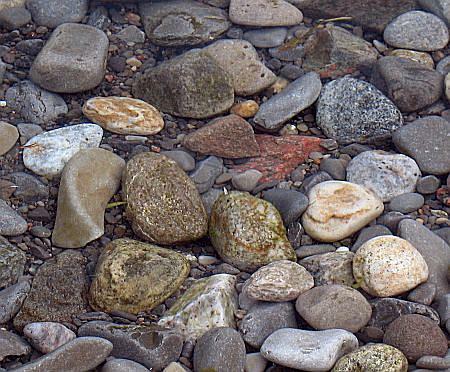
wading in the St. Lawrence
photo - mw
_______________________
Joe Amato in conversation with Chris Pusateri
jacket
.
.. nothing gets my goat more than a poet who wants to talk about quantum uncertainty, but has no idea how a ratchet works. To say it in more abstract (some will say, dour) terms: industrial poetics places the realm of facticity squarely under poetic purview. Not facts as eternally stable, but facts nonetheless. And facts that circle about this question of our built environment, and its relation to the natural world (formerly Nature). Langston Winner made the point long ago about the ever-more-prevalent black-boxing of new technologies, and while the industrial hardly augurs a hands-on demonstration of block and tackle logic, it has at least the advantage of encouraging one to imagine things in process terms. Material is transformed with a purpose, or telos, and conceiving of our commodities in such terms can become a means of getting one’s mind dirty with the grimy details of said transformations. ...(more)
_______________________
This Is The Story
I have been a long time in this story of where I am.Now that I am back, this is the story of the yard, this is the story of Narcissus, this is the chair someone sat on in the fire, this is the vegetarian prawn sauce and these are the woodchips that come frozen in little plastic bags, these are the strange lines the pigeons walk in the sky tracing the worm paths, so this is the cigarette field where we grow the albino fruit, this is the tortilla at dawn, the instructions for your phone and the empty tea box beside the bed, these are the peanut shells I wrote your name on and your name piled up in a bowl, so this is the rain sound out on the roof, the sound of airplanes in the yard at dawn.
Four Poems
Ethan S. Bull
Exquisite Corpse
_______________________
She Had No Costume
Kim Chinquee
Outside, skeletons were knocking. She’d flown early, noticing the time change. Her girl slept in the crib, and this country wasn’t home yet. Each base a hotel, and the uniform hadn’t made her fearless. The gun on her hip wasn’t on her hip and now everyone walked in the rain.
Soldiers at the door now, though soldiers really weren’t soldiers. Once there was a pumpkin, but there is no autumn. Ghosts and witches and some dressed in corruption.
She put on her fatigue hat, and her chevrons were sanctioned. She felt lucky, on this side of the ocean, her youth still an option. Her girl crawled, dreaming into daytime, a childhood of circuses and people. And here now: boom, a tribe of Halloween voices.
Three Stories
Kim Chinquee
conjunctions
_______________________
"War represents the uniformed hospital and operating room phase of an overall remedial pathology in treatment of man's affairs. In this inherited scheme of life, science and technology are invoked directly by society only at the eleventh hour to arrest the malady fostered by laissez faire, ignorance, opinion, shortsightedness, prejudice and egocentricity. Formally declared war is the final spectacular and open chapter following the prolonged and far more sanguinary private and non-spectacular chapters of strife under the guise of 'Peace'."
-
Buckminster Fuller
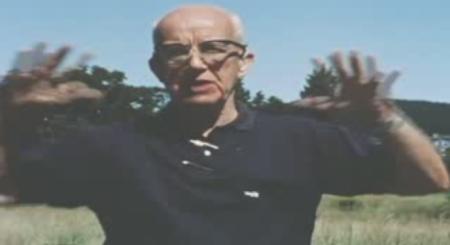
Buckminster Fuller
b. July 12, 1895
photo found here
_______________________
When all is said, there is no individual poet who administers poetry, and if a poet sets himself up to accuse his fellows or if some other poet wastes his life in defending himself against reasonable or unreasonable charges, it is my conviction that only vanity can so mislead us. I consider the enemies of poetry to be found not among those who practise poetry or guard it but in mere lack of agreement in the poet. For this reason no poet has any considerable enemy other than his own incapacity to make himself understood by the most forgotten and exploited of his contemporaries, and this applies to all epochs and in all countries.
(...)
We have inherited this damaged life of peoples dragging behind them the burden of the condemnation of centuries, the most paradisaical of peoples, the purest, those who with stones and metals made marvellous towers, jewels of dazzling brilliance - peoples who were suddenly despoiled and silenced in the fearful epochs of colonialism which still linger on.
-
Pablo Neruda, Towards the Splendid City
Nobel Lecture, December 13, 1971
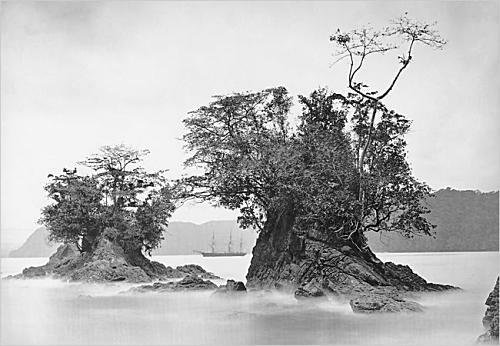
View of a Three-Masted Sailing Ship
Panama
Timothy O'Sullivan
1870
1 2 3 4
Timothy O'sullivan: Shadows of Subjectivity in the Documentary Form of the Nineteenth-Century
'Surrealistic and disturbing': Timothy O’Sullivan as Seen by Ansel Adams in the 1930s
Britt Salvesen
Journal of Surrealism and the Americas, Vol 2, No 2 (2008)
_______________________
Seven Stories from Once and Upon: Sixty Tiny Tales
Douglas Messerli
EXPLORINGfictions
Memorization
Right in the middle of forgetting I forgot, remembering at last what was about to be lost. Yet it had apparently passed, since I could not now recall why I had wanted to forget or why in the midst of forgetting I could suddenly recall all. Eventually I knew I would forget, and having forgotten would attempt to recall what I had this time not. Fearing that, I attempted to memorize the past, and repeating it over and over, in retrospect, I began to realize that I had already forgotten a lot, the colors of clothes and rooms, the smells of—was it summer? the seasons, the sounds of certain voices, and the sources of the voices themselves. Now I knew everything only in outline, and the more I retraced the outline the more I comprehended how its contents had been condensed, until I saw what was within as only a spot, a dot that stood for all that it was and could then have been. Until it appeared that nothing really had occurred, although it might have if only I had drawn in a deeper breath or studied the ceiling, a dress, or listened for what must or should have been said. And so it seemed now that nothing really had been spoken—although there were certain sentences that I seemed to remember such as: Are you certain? And as certain in such a circumstance as such an uncertain person as me can be—or accomplished by my committing it to memory, or even remembered and finally forgot.
...(more)
_______________________
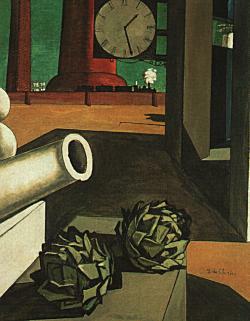
The Philosopher's Conquest
(1914)
Giorgio de Chirico
b. July 10, 1888 201 images
_______________________
The Politics of Time: Modernity and Avant-Garde
Peter Osborne
full text online
.....................................................
I heard about this book just as I was finishing my PhD not too many years ago, and checked it out of my university’s library. It was astoundingly good and helpful… The stuff on Heidegger and Benjamin, in particular, left a real mark on me and has influence my work significantly. But the problem was, back then as I was finishing up, that there was only one copy in our library and as soon as I would get my hands on it, it would get recalled. I hemmed and hawed because it was out of print, and the only copies on Amazon were selling for more than $100. Eventually, that’s just what I paid for it – and probably had it back in my hands too late to use it the way I needed to.
At my previous job, I insisted that my graduate seminar of 20+ students read it… Even if it was unlikely that all or any of them would be able to get their hands on copies. (I reproduced the last chapter for them…) Anyway, all of this would have been moot if it had been on-line as it is now. So, you know, obviously – go read! It’s free!
- ads without products
_______________________
Theory’s Empire: Reflections on a Vocation
for Critical Inquiry [PDF]
Harry Harootunian
We have no doubt reached the juncture where theory and its offspring cultural studies are under siege and, in some advanced places, in full rout. What is important about the place we currently occupy is that it inflects a larger historical conjuncture we are moving through marked by economic failure, political repression (nobody wants to use the f word, but fascism in its second coming more accurately describes our moment), and the imminent prospect of senseless imperial wars, already inaugurated by the illconceived invasion of Iraq and endless shapeless military occupations.One of the many uses (and thus abuses) of 9/11 has been that it has permitted a wholesale rejection of theory, which was already underway before the big push, and widespread denunciation of cultural studies and multiculturalism as symptoms of loosening standards and the corrosive curse of unchecked relativism. But these charges are simply steroid-induced manifestations of earlier claims that sought to persuade the public that universities had fallen into the dirty hands of 1960s radicals.(....)
What I’m suggesting is that the apparent collapse of theory and the distrust of cultural studies was already prefigured by endorsements that sought to place it within the system and make it a part of normal professionalization that had, and would have, no relationship to the world outside of the academy. In this regard, theory was transmuted into a functional prerequisite of professionalization. The functionalism that had once dominated the social sciences had metastasized and spread into the humanities,notably in the field of literary studies. _______________________
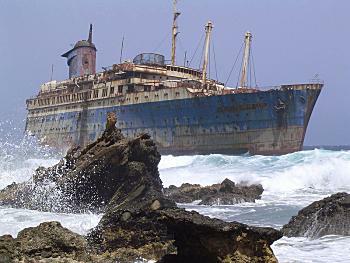
Wreck of the American Star
Fuerteventura, Canary Islands
photo by BLueFiSH 2005
.....................................................
Keats: Coda: Echo and Variation
Tom Clark
I
Mariners don’t think too much about the deeps
Of the Other at the bottom of the ocean.
Like a sort of north star which in shining
Accelerates all my thought from far off,
Identity presses on me so all day
As to tease sleep out of my anxious mind.
Melancholy lunes, identifying with
Tom dismal and forlorn and spitting blood.
Heart, ever out of its element, keeps
Identifying with Hamlet, a dying
Sun beats down, the confused heifer lows,
Feeling nature’s mass fall and spill like
A blade. Light plays cleanly upon bronze.
Above the victim’s head the priest suspends
Our fear of death. And this abandoned town –
Where love melds into death, and vanishing
Sleep fills itself with ominous programs,
The whole fate drama hoving into view
Before dawn under the lyric stars –
Tacks around the cove and disappears.
...(more)
_______________________
Brooklyn Trilogy
Eduardo Lago
Translated from the Spanish by Ernesto Mestre-Reed
words without borders
When Enrique Vila-Matas realized that he was riding on the same bus as J.D. Salinger, that most invisible of writers, he was overcome with emotion and made up his mind to follow him. It was a bold decision, for not only did he not speak a word of English, but he did not have the slightest idea how to get around in a city as confusing as New York. When the author of The Catcher in the Rye got off the bus, the Catalan writer followed him. They cut two lonely figures on the stretch of the sidewalk along Central Park. Anxious, the Catalan flipped up the collar of his raincoat, put on his hat and a pair of sunglasses, and waited for the New York novelist to go on his way. Completely unaware of Vila-Matas's presence, Salinger headed for a wide path and started to cross the park. Vila-Matas counted to three before beginning his pursuit, managing to keep a prudent distance most of the time. Twenty-six minutes later, the two novelists came out from the park up by the Dakota. Salinger went down 72nd Street, with Vila-Matas on his heels. They looked like two comic book characters....(more)
_______________________

Photographic notes from a madhouse
photographs and text by
lauren e. simonutti
lens culture
Sequestered in the house that I had made, a madhouse in its own right, only leaving to see the doctor or for food, I am dosed with as much stardust* as a body can take without breaking, trying to balance the threat of organ failure against the redirection of the bio-chemical misfirings that conspire to convince me to destroy all.
(*Lithium really is stardust. It is the 3rd to last element that an exploding star expels before it goes nova. Only hydrogen and helium come after).
lauren e. simonutti1 2
via Ordinary finds
_______________________
onedit 13
Elizabeth Treadwell
2 from Shell keep
[such wild]
such wild syllables into
the qualities of the planet
our lives upon it
the gawky orders of the universe
the surly wife-bur, oh fulsome astronaut
our many-headed worryboard
oh so soonly shall we toil
our awesome landfills
all the pick-magic some forlorn
source faces
there’s a boat in the sea fevertine
there’s a fawn in the feldspar
the sputnik of justice
swirls
the blaze-sharp earth, our families ...(more)
Elizabeth Treadwell
_______________________

Wolfe Island wind farm
Kingston
photo - mw
_______________________
Romania. A Post-history Hysteria
Chris Tanasescu
translated from the Romanian by David Baker and the author
Guernica Magazine
How long have we been so utterly alone
together? We’ve been speaking the same
shifting language for twenty centuries, yet
it’s as if we’ve always needed translation:
trading traditions with others yet foreigners
to ourselves. I’ll take you home, feed you
to my land. We’ll meet there in the earth
and talk—my Daco-Roman words for hospitality
and hostile army are nearly the same.
...(more)
via totalitarianism today
_______________________

photo - mw
_______________________
Forget Shorter Showers: Why personal change does not equal political change
Derrick Jensen
Orion Magazine
Would any sane person think dumpster diving would have stopped Hitler, or that composting would have ended slavery or brought about the eight-hour workday, or that chopping wood and carrying water would have gotten people out of Tsarist prisons, or that dancing naked around a fire would have helped put in place the Voting Rights Act of 1957 or the Civil Rights Act of 1964? Then why now, with all the world at stake, do so many people retreat into these entirely personal “solutions”?
Part of the problem is that we’ve been victims of a campaign of systematic misdirection. Consumer culture and the capitalist mindset have taught us to substitute acts of personal consumption (or enlightenment) for organized political resistance....(more) via Dialogic
_______________________
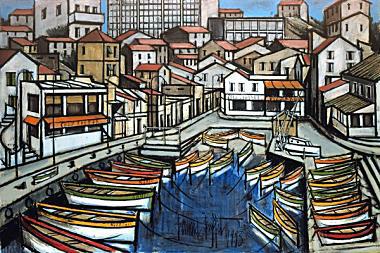
Marseille
Bernard Buffet
b. July 10, 1928

Christian Chaize Christian Chaize @ Jen Bekman
via
Five years ago, Portugal did present itself as a new landscape in my life - both literally and metaphorically. Since then, I have photographed exclusively along a very small stretch of its southern coastline. Returning to this specific place, I've sought out its nuances. In doing so, I have peeled back layers of how I see, and how I experience this magical environment.
The results of my slight obsession have evolved into two distinct series. Here are two images from Praia Piquinia, a body of work focusing on a singular, secluded beach front in which all of the pictures are taken from essentially the same elevated angle. What the still life was for Morandi, this beach is for me. ...(more)
_______________________
You with the Crack Running through You
Kim Addonizio
drunken boat
I can seep in, I can dry clear.
And yes it would still be there.
And no I couldn’t hold you forever.
But isn’t t it drafty at night,
alone in that canyon
with the wind of the mind
dragging its debris—
I wanted to put
my mouth on you
and draw out whatever toxin…
—but I understand. There are limits
to love. Here is a flower
that needs no water.
It can grow anywhere,
nourished on nothing.
And yes.
.....................................................
This should keep you busy for a good while.....
Drunken Boat 10th anniversary issue
It’s been a decade in the making and seemingly much longer in the production, but at long last we have our 10th anniversary issue. Inside, you’ll find ten folios, each teeming with artwork and materials. Each folio features background photographs by Founding Editor/Art Editor Emeritus, Michael K. Mills. We offer you Poetics with 100 contemporary poets, Electronic Arts with meditations on where the past and future of arts online come from and point towards, the alternative traditions of Conceptual Fiction, Arts in Asia with a taste of work being produced in India, Bangladesh, Singapore and elsewhere, a continuation of our look into Mis/Translation including the multimedia Cartagena Project, a section on VisPo and Cine-Poems that marries the visual and textual, a small dose of Nonfiction which is a precursor of things to come, a collaboration with Survival International on the plights and arts of Tribal Peoples whose culture and way of life is being threatened, an archival section dedicated to the pedagogy of the Black Mountain School (1933-1957) and our Best in Show, a look back at 10 years of Drunken Boat.
_______________________
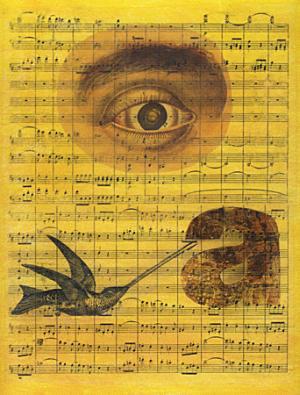
Camille Martin
.....................................................
Codes of Public Sleep
Photos and text
Camille Martin
Streetnotes
Winter 2003
a people speak from stony edges, urging linked memory native to crowd,
place effects in proportion to privacy, skin of native, an ambulatory balancing act as far as a musky smell
on a street naked from inside out. skin of public, of converging theys disillusioned at a given time
in which a city breathes or one or two breathe, in time to common emotions.
ideas of an idea changing shape, unable to explain, only to point to an opening in a city in which voices enter
and thicken. afterward bodies are there in that now again, hearts and heart pumping, float downward and crouch
on sidewalks. a simple madrigal in the open promotes privacy in proportion to skin between air and air.
faint semaphores in a scripted opening shadow a city from self to self, to get a better crack at what’s unmarked,
to get a stony edge of skin to be translucent and slept in, naked scripted errors in that now, or some memories of an invention
of natural languages, mutually captured mutually open, unable to figure how to get back the same way
through parts of speech. how is being one of them a common receptacle, holding to central colors, talking words
in the whole score. given words, publics on loan, bridges in a manner of parceled space, draping
with now from body to body, sliding into, sliding out of, nickelodeons of merge sway verge,
interest approximating function holding to an average temperature.
...(more)
Xcp: StreetnotesEthnography, Poetry, & the Documentary Experience... a biannual electronic exhibition space for socially descriptive art and text.
EPC/Camille Martin Home Page
_______________________
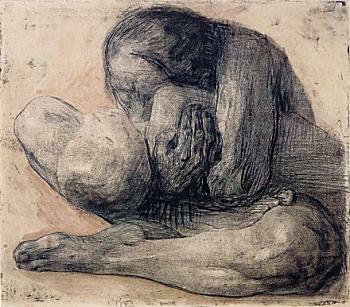
Käthe Kollwitz
(July 8, 1867 - April 22, 1945)
1 2 3 4 5
_______________________
Will What We Don't Know (or Care to Know) Hurt Us?:
Mourning Michael Jackson, Ignoring the Afghan Dead
Tom Engelhardt
_______________________
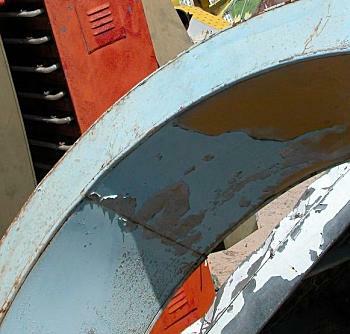
Neon Boneyard Vegas
Laura Domela Photography
via
_______________________
fabled hue
Camille Martin
why a memory of birds flying into a cloud
keeps morphing outside all the history books,
pastel maps of successive conquerings
tiny tooms away. what birds remember
of shifting winds and hidden perches
with clerar views. why a photograph makes
a story impossible in the increasing fog
of dna, while one's heart keeps beating
a notion of species in the mind, pictures
of a grand theory of animal forever one
guies behind. ........(more)
_______________________
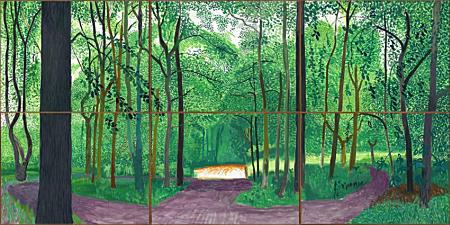
Woldgate Woods
July 2006
The East Yorkshire Landscape
David Hockney
_______________________
On the Difficulty of Being Glocal
Bruno Latour
It’s as if the metaphor of ‘roots’ had been turned upside down: the more ‘uprooted’ by the forces of modernization, the farther down identities are attaching themselves. Modernization, with its clear frontlines, has become as confusing as a game of Go at mid-play.
Hence the success of the word glocal, which signifies that labels can no longer be safely positioned along the former scale, stretching, by successive extensions, from the most local to the most universal. Instead of subtracting one another, conflicting identities keep being added. And yet they remain in conflict and thus have to be sorted out, since no one can belong to all of them at once…
But if the compass of modernization is spinning so madly, how can we distinguish between legitimate and illegitimate glocal attachments?(....)In the old cosmopolitan view, there were no politics and no cosmos because the higher unit was already given: one had only to break away from one's own attachments in order to reach it. But in Stengers' view, there is no more strenuous task than to invent political tools capable of revealing how all cosmos differ from one another. It's an even more risky endeavour to imagine how they could be gathered into some future common arrangement. If cosmopolitan is an adjective fit for a fashion magazine, cosmopolitics, on the other hand, is the duty of the future, the only way to build the common Domus.
...(more)
_______________________

Welcome back
J P returns
after a looooong hiatus J P has been the host of
the alliance
of world weary webloggers standing honourably & intelligently together
and the celestial autre blog

Passages from Finnegans Wake
Mary Ellen Bute
1906 - 1983 FlashPoint - Summer 2009, Web Issue 12
celebrating Finnegans Wake
"In the muddle is the sounddance"
Another Introduction to the Reading of Finnegans Wake
Karl Reisman
FlashPoint
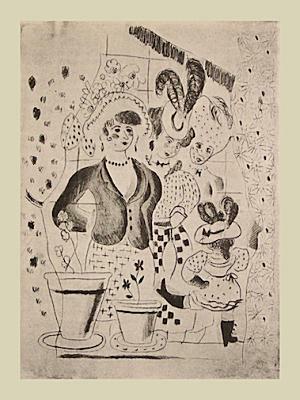
Legging a Jig
Illustrations for Finnegans Wake
Stella Steyn
1907 - 1987
FlashPoint
_______________________
How Does Our Language Shape The Way We Think?
Lera Boroditsky
The fact that even quirks of grammar, such as grammatical gender, can affect our thinking is profound. Such quirks are pervasive in language; gender, for example, applies to all nouns, which means that it is affecting how people think about anything that can be designated by a noun. That's a lot of stuff!...(more)
_______________________
Being and Time, part 5: Anxiety
Simon Critchley
What is first glimpsed in anxiety is the authentic self. As the world slips away, we obtrude. I like to think about this in maritime terms. Inauthentic life in the world is completely bound up with things and other people in a kind of "groundless floating" – the phrase is Heidegger's. Everyday life in the world is like being immersed in the sea and drowned by the world's suffocating banality. Anxiety is the experience of the tide going out, the seawater draining away, revealing a self stranded on the strand, as it were. Anxiety is that basic mood when the self first distinguishes itself from the world and becomes self-aware.
Anxiety does not need darkness, despair and night sweats. It can arise in the most innocuous of situations: sitting in the subway distractedly reading a book and overhearing conversations, one is suddenly seized by the feeling of meaninglessness, by the radical distinction between yourself and the world in which you find yourself. With this experience of anxiety, Heidegger says, Dasein is individualised and becomes self-aware.
Anxiety is the first experience of our freedom, as a freedom from things and other people. It is a freedom to begin to become myself. Anxiety is perhaps the philosophical mood par excellence, it is the experience of detachment from things and from others where I can begin to think freely for myself. Yet, as Heidegger was very well aware, anxiety is also a mood that is powerfully analysed in the Christian tradition, from Augustine to Kierkegaard, where it describes the self's effort to turn itself, to undergo a kind of conversion. Heidegger's difference with Christianity is that the self's conversion is not undergone with reference to God, but only in relation to death, which is the topic of next week's blog....(more)
part 1: Why Heidegger matters
part 2: On 'mineness'
part 3: Being-in-the-world
part 4: 'Thrown into this world'
_______________________
 Zapallal/Yurinaki
Andrés Marroquín Winkelmann
collaborative pictures and a children's photography workshop
Peru via The Exposure Project
_______________________
When Poetry Becomes Visual:
Derrida’s Monolingualism of the Other
Tom Hibbard
jacket
Appearance as form is part of many contemporary discussions. It has to do with religious authority. It has to do with running a national economy. It has to do with destruction of the environment. It has to do with gay marriage. It has to do with language. One piece of writing in particular that takes up directly the notion of form versus the new-world abyss of simultaneous sensory input in a credible, profound way is Jacques Derrida’s book, Monolingualism of the Other or The Prosthesis of Origin.
Though it is for many controversially, forbiddingly abstract in its title, this 93-page tract — which shows Derrida precariously aloft, a not-quite fully recognized philosopher but still an “ivory tower” middle-of-the-roader, no laying-it-on-the-line radical or world-weary novelist — has an aura of summation and momentousness, is truly poetic, truly globally engaged. Brief as it is, it is still complex and fundamental in the ideas that it brings out, incompletely, impressionistically, with room for others to glide along. ...(more)
_______________________
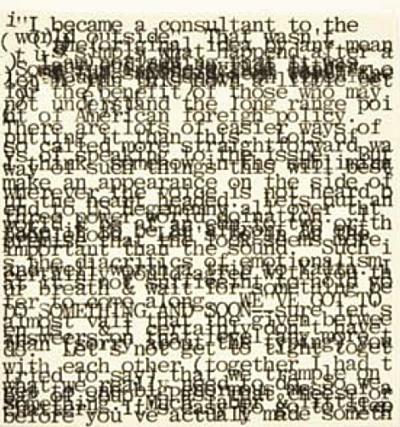
Veil
Charles Bernstein
1978
Socio-Poetics of Typewriting [PDF]
TypeBound:
Books as Sculpture and Typewriter Poems
University of Central Florida Art Gallery
_______________________
Changing the Past of the Future [PDF]
Juhan Maiste
The past, the present and the future, which, as we remember, existed intertwined in man’s spirit and consciousness according to St. Augustine, have been hopelessly torn asunder in the Modernist treatment of the world. This has been the case, not just in Le Corbusier’s fantasies, but also in conservation, in its aspiration to preserve in an empty space extolled symbols of past glory – churches, monasteries, common graves and lighthouses. The past has been left alone; it has been taken advantage of as was the Virgin, who, having given birth to the Baby, gave her promise to redeem the future. Events appear out of emptiness and disappear into emptiness, being strung on the linear axis of history; it is so easy to describe them in the framework of one or another discourse regarded as part of the historical writing on the eternal struggle between Persians and Greeks, the East and the West, different countries and peoples. The faith in the possibilities of objective truth born in the Age of the Enlightenment has led to the institutionalisation of the narrative of history; museum culture has put up security gates to guard it and the cult of monuments has established enclaves for it. If it is possible to compare history in the age of Modernism with religion, conservation can be compared with the church serving that religion. On the one hand, there is a circle of Freemason intellectuals at the establishment of that religion, while, on the other hand, all the then pro-imperialist people, regardless of the state whose interests they represented, are also involved in it. Similar to the church or any other institution (the police, the army etc.) at the service of any nation, conservation is concerned that the difference between history and the symbols and organisations explaining and marking that history should be as small as possible, or better still non-existent.
Establishment of a history is accompanied by the wish to delegate one’s dreams and ambitions beyond oneself, to invent myths and find the visual symbols or icons of these myths ‘in stone and in glass’.
KOHT ja PAIK /
PLACE and LOCATION
Studies in Environmental Aesthetics
and Semiotics VI
_______________________
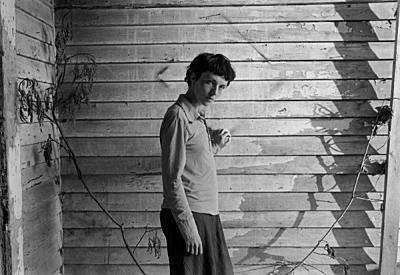
The grey that blankets the living...
Mark Steinmetz
Americansuburb X
1 2 3
_______________________
Printing Pictures
Tony Fouhse
I believe that making prints is what separates the men/women from the
boys/girls. You see, making a print is a form of commitment. It forces
you to make hard choices because you’re going to spend extra time and
energy and money turning your ones and zeros into something you can
hold.
As well, printing changes the way you look at images. They are no longer
back lit, glowing, things on your screen…..they take on a life of their own.
You leave them laying around, or pinned to a wall. You bump into them
on your way to the bathroom, or when you just get up. You can put the
prints in books and carry them around. They’ll have way more weight
than showing pix on your fucken iPhone. It’s a fact....(more)
_______________________
burn
ian evolving journal
for emerging photographers
curated by
magnum photographer
David Alan Harvey
via Jim Johnson
_______________________
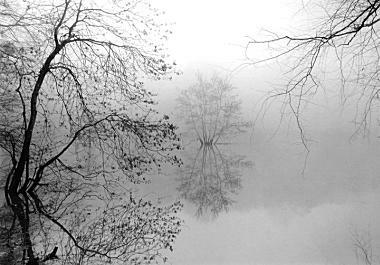
Sandy Creek
Athens, GA
Mark Steinmetz
The Tree
James Cohan Gallery
gmtPlus9 (-15)
_______________________
Historic Maps from the National Archives of Canada/ArchivaNet
via resourceshelf
_______________________
Paul Feyerabend
Stanford Encyclopedia of Philosophy
substantive revision Mon Jun 1, 2009
Against Method explicitly drew the “epistemological anarchist” conclusion that there are no useful and exceptionless methodological rules governing the progress of science or the growth of knowledge. The history of science is so complex that if we insist on a general methodology which will not inhibit progress the only “rule” it will contain will be the useless suggestion: “anything goes”. In particular, logical empiricist methodologies and Popper's Critical Rationalism would inhibit scientific progress by enforcing restrictive conditions on new theories. The more sophisticated “methodology of scientific research programmes” developed by Lakatos either contains ungrounded value-judgements about what constitutes good science, or is reasonable only because it is epistemological anarchism in disguise. The phenomenon of incommensurability renders the standards which these “rationalists” use for comparing theories inapplicable. The book thus (understandably) had Feyerabend branded an “irrationalist”. At a time when Kuhn was downplaying the “irrationalist” implications of his own book, Feyerabend was perceived to be casting himself in the role others already saw as his for the taking. (He did not, however, commit himself to political anarchism. His political philosophy was a mixture of liberalism and social democracy).
He later said:
One of my motives for writing Against Method was to free people from the tyranny of philosophical obfuscators and abstract concepts such as “truth”, “reality”, or “objectivity”, which narrow people's vision and ways of being in the world. Formulating what I thought were my own attitude and convictions, I unfortunately ended up by introducing concepts of similar rigidity, such as “democracy”, “tradition”, or “relative truth”. Now that I am aware of it, I wonder how it happened. The urge to explain one's own ideas, not simply, not in a story, but by means of a “systematic account”, is powerful indeed. ...(more)
thanks to Stephen Downes
_______________________
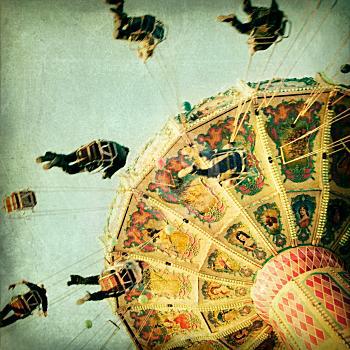
Irene Suchocki Photography
Irene Suchocki on Flickr and Etsy

The Love Embrace of the Universe
the Earth [Mexico], Me, and Señor Xolotl [the dog]
1949
Frida Kahlo
(July 6, 1907 - July 13, 1954)
_______________________
The Museum of Stones
Carolyn Forché
New Yorker March 26, 2007
This is your museum of stones, assembled in matchbox and tin,
collected from roadside, culvert, and viaduct,
battlefield, threshing floor, basilica, abattoir,
stones loosened by tanks in the streets
of a city whose earliest map was drawn in ink on linen,
schoolyard stones in the hand of a corpse,
pebble from Apollinaire’s oui,
stone of the mind within us
carried from one silence to another,
stone of cromlech and cairn, schist and shale, hornblende,
agate, marble, millstones, and ruins of choirs and shipyards,
chalk, marl, and mudstone from temples and tombs,
stone from the silvery grass near the scaffold,
stone from the tunnel lined with bones,
lava of the city’s entombment,
chipped from lighthouse, cell wall, scriptorium,
paving stones from the hands of those who rose against the army,
stones where the bells had fallen, where the bridges were blown,
those that had flown through windows and weighted petitions,
feldspar, rose quartz, slate, blueschist, gneiss, and chert,
fragments of an abbey at dusk, sandstone toe
of a Buddha mortared at Bamiyan,
stone from the hill of three crosses and a crypt,
from a chimney where storks cried like human children,
stones newly fallen from stars, a stillness of stones, a heart,
altar and boundary stone, marker and vessel, first cast, lode, and hail,
bridge stones and others to pave and shut up with,
stone apple, stone basil, beech, berry, stone brake,
stone bramble, stone fern, lichen, liverwort, pippin, and root,
concretion of the body, as blind as cold as deaf,
all earth a quarry, all life a labor, stone-faced, stone-drunk
with hope that this assemblage, taken together, would become
a shrine or holy place, an ossuary, immovable and sacred,
like the stone that marked the path of the sun as it entered the human dawn.
.....................................................
Carolyn Forché at Modern American Poetry and The Poetry Foundation
Mechanical Angel: Carolyn Forché and the Material Projection of Messianic History
Alan Clinton
The work of Carolyn Forché has always retained a political edge, with works such as the exploration of her Czech background in Gathering the Tribes (1976) and her account of visits to El Salvador in The Country Between Us (1981). Forché has been one of the leading poets who, in her own words, has combatted the "self-censorship operative among American poets and writers that seemed to preclude writing about...historical events when those events were still unsafe". Her third book of poems The Angel of History (published 13 years later), however, represents a new turn for her work, one whose title and epigraph suggest the key role of cultural theorist Walter Benjamin. While Forché has alluded to the influence of Benjamin in a Text and Performance Quarterly interview, the extent to which her work embodies the principles of Benjamin's messianic materialism remains unexplored. This engagement with Benjamin not only brings Forché's own poetry to a new level of historical complexity, but also makes The Angel of History one of the important poetic texts of the last decade.
Benjamin's work has, for a good portion of the 20th century, held a marginal place in cultural studies. Due to his premature death and conflict with the "Cultural Studies Industry" of the Frankfurt School, Benjamin's radical version of historical materialism had to wait until after 1968 to begin its rise to the relative popularity it holds now. Still, today's publishing apparatus encourages work with Benjamin's groundbreaking ideas more than with his innovative forms. This discrepancy is somewhat ironic given Benjamin's interest in the new technologies of the 19th and 20th centuries, for such technologies as photography and cinema radically changed the form in which people received information and perceived the world. Even with the rise of Benjamin's popularity in the context of poststructuralism and now hypertext, formal experimentation enjoys a much surer hold in creative writing than in critical work.
For her part, Forché both explicitly and implicitly utilizes Benjamin's theories of historical materialism and the forms he believes such inquiry should take. With respect to the stylistic shift between The Country Between Us and The Angel of History, Forché states, "I began to feel that there was a certain kind of poem that I was writing, that my contemporaries were writing...some of us were very good at it; some would grow fatigued" (Ibid.). In Benjaminian terms, the workshop-inspired political poem had developed an aura. While other sorts of politically engaged poetry had been written (most notably by poets of the L=A=N=G=U=A=G=E school), the primary sort of poetry published and taught in creative writing departments took the form of single-voiced testimony, and this training has had a lasting political effect: "I received a certain education, which included a Master of Fine Arts in poetry, and the particular aesthetic concerns of that institutionalized education became my own, unquestioned". Forché's reading of Benjamin, I believe, helped her question her aesthetic concerns and ultimately transform her style of political poetry. That transformation in turn warrants a closer inspection of other auratic discourses such as the academic essay and the procedures of normal science. ...(more)
_______________________
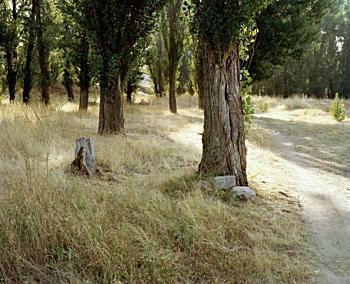
Stones
Xavier Ribas
Made distraught by the storm and a promise he had made in life to his recently deceased wife, the man curses the road that runs right by his doorstep. He sees the road as a threat to the universe of the house, of domesticity and intimacy. The road shall bring to his doorstep the unknown and the undesired, and at the same time carry away all that the house keeps hidden, of life as well as death: "But it seems hard that a man in his need could be so flounted by a road", exclaims this man locked up in himself, for whom the 'long ways' of the road and everything that needs to be always moving from one place to another is in conflict with the verticality and rooting of trees, of the house and of man (William Faulkner As I Lay Dying).
Gaston Bachelard writes about the poetic image offered by the house's intimate spaces, but he also writes about all spaces that invite us to come out of ourselves, about provisional refuges and occasional shelters. Images of intimacy are not just the product of our dreams of rest, writes Bachelard, but also of dreams of the man that walks, his roads, his crossroads, his roadside benches: all really inhabited space bears the essence of the notion of home. If the flowers by the side of the road mark a place of separation, loss and passage, the tree, the stone and the shadow, in contrast, represents a meeting place, a place of recollection, of abiding.
- Xavier Ribas
_______________________
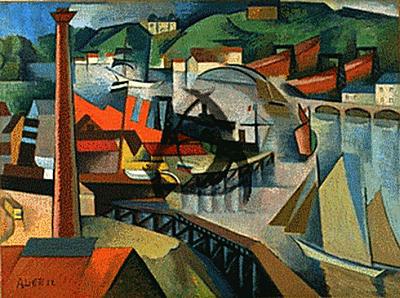
entrance to the pool
1912
André Lhote
(5 July 1885 – 24 January 1962)
_______________________
The Testimony Of Light
Carolyn Forché
Our life is a fire dampened, or a fire shut up in stone.
--Jacob Boehme, De Incarnatione Verbi
Outside everything visible and invisible a blazing maple.
Daybreak: a seam at the curve of the world. The trousered legs of the women
shimmered.
They held their arms in front of them like ghosts.
The coal bones of the house clinked in a kimono of smoke.
An attention hovered over the dream where the world had been.
For if Hiroshima in the morning, after the bomb has fallen,
is like a dream, one must ask whose dream it is.
Must understand how not to speak would carry it with us.
With bones put into rice bowls.
While the baby crawled over its dead mother seeking milk.
Muga-muchu: without self, without center. Thrown up in the sky by a wind.
The way back is lost, the one obsession.
The worst is over.
The worst is yet to come.
.....................................................
Carolyn Forche: The Poetry of Witness
interview by Steven Ratiner
Christian Science Monitor
All journeys are wise - when viewed with enough time and distance. Looking back on life's passages, the wrong turns and chance meetings, even dead-end streets can assume a place in a clear and purposeful progression. It's in the day-to-day navigation that an individual's inner compass and determination are tested. And for an artist, the sum of those daily choices, both mundane and monumental, leave an indelible mark on the character of the individual and the content of the creation.
Entering the middle passage of her life, poet Carolyn Forche has received more acclaim and notoriety, witnessed more instances of cold brutality and generosity of spirit than one might expect in several lifetimes. This past month saw the publication of ``The Angel of History,'' the first new collection of her work in over 13 years. I met with the poet at her Maryland home. The two-hour interview I'd arranged somehow expanded into an eight-hour marathon conversation. And the lasting impression I came away with concerns the tangled, dangerous, and utterly guileless path she has traveled in her life. Hers has been a triumph of the honest choice over the expedient, the strength of personal commitment over the tidal sway of public opinion. Along the way, and very likely because of it, she has created a collection of verse that addresses the terror and inhumanity that have become standard elements in the 20th-century political landscape - and yet affirms as well the even greater reservoir of the human spirit....(more)
_______________________
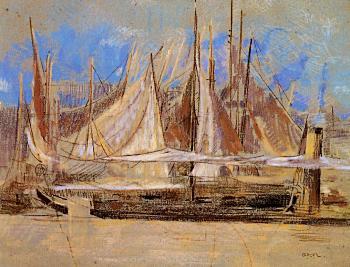
Yachts at Royan
Odilon Redon
d. July 6, 1916
_______________________
Sequestered Writing
Carolyn Forché
Horses were turned loose in the child’s sorrow. Black and roan, cantering through snow.
The way light fills the hand with light, November with graves, infancy with white.
White. Given lilacs, lilacs disappear. Then low voices rising in walls.
The way they withdrew from the child’s body and spoke as if it were not there.
What ghost comes to the bedside whispering You?
—With its no one without its I—
A dwarf ghost? A closet of empty clothes?
Ours was a ghost who stole household goods. Nothing anyone would miss.
Supper plates. Apples. Barbed wire behind the house.
At the end of the hall, it sleepwalks into a mirror wearing mother’s robe.
A bedsheet lifts from the bed and hovers. Face with no face. Come here.
The bookcase knows, and also the darkness of books. Long passages into,
Endless histories toward, sleeping pages about. Why else toss gloves into a grave?
A language that once sent ravens through firs. The open world from which it came.
Words holding the scent of an asylum fifty years. It is fifty years, then.
The child hears from within: Come here and know, below
And unbeknownst to us, what these fields had been.
_______________________
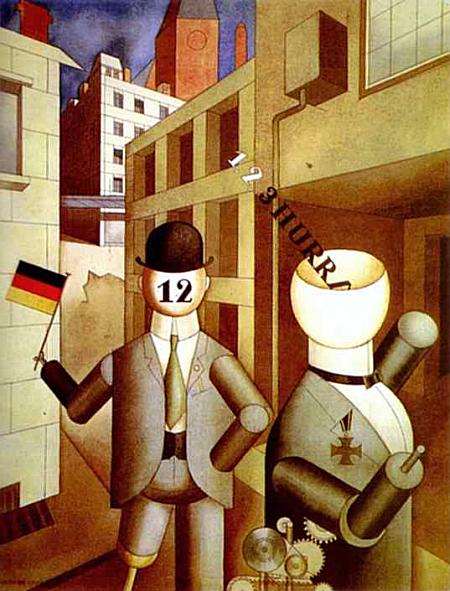
Republica Automatons
1920
George Grosz
d. July 6, 1959
_______________________
Sarah wanted everyone to know that she’s not having fun and people are being mean to her and she doesn’t feel like finishing her first term as governor.
- Maureen Dowd
She's DoneJosh Marshall
TPM Reader MC checks in ...
Am I living in Bizarro world? Does anyone really think that there is any realistic way Palin could be a candidate for President after resigning as governor? Yet pundit after pundit is saying this is a "risky" move that "may pay off". This is absolutely preposterous, and any professional putting such ideas into print should be relegated to writing copy for infomercials. All one needs to do is imagine the campaign ads (Can we Trust S.P. to Finish What She Starts?; Palin Quits When She's Tired, Winners Quit When They're Done; or just string together a few clips from the Mistake by the Lake) to realize there is no recovering from this. This is no wily strategic move; it's running from a scandal.
As I said earlier, I think there's a small chance there's no specific scandal and that Palin is just very mentally unstable. But MC is 100% correct that any pundit who thinks this is some risky but potentially brilliant strategic move is absolutely smoking crack. Hitting the crack pipe, or, just as likely, being witlessly contrarian to set themselves apart from the common herd of sane people. The kinds of ads MC mentions are right on the mark. But they're really only the beginning.
Sarah Palin Turns ProPaul Begala
I wish Hunter S. Thompson had lived to see this.
As Hunter said, "When the going gets weird, the weird turn pro." Sarah Palin makes Mark Foley, the congressman who sent filthy emails to pages look almost normal. She makes David Vitter, the senator who was hanging out with hookers, look almost boring. She makes Larry Craig, caught hitting on a cop in a men's room, look almost stable. She makes John Ensign, the senator who was having an affair with a staffer, look almost humdrum (and compared to the rest of the GOP whack-jobs, he is). And she makes Mark Sanford, the governor with the Latin lover, look positively predictable.
It was an almost impossible mission, but in resigning from office with 17 months to go in her first term, Sarah Palin has made herself the bull goose loony of the GOP....(more)
It Came from Wasilla Todd S. Purdum vanity fair
_______________________

Boats in Port
André Lhote
1918-1920
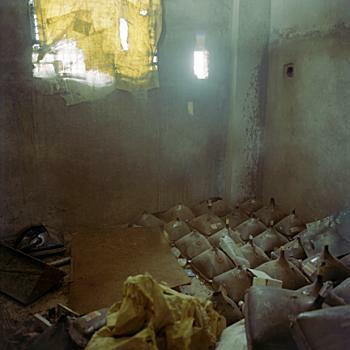
Cathode Ray Tube storage
E-wasteland
India
Sophie Gerrard
riley dog
_______________________
Finding the Phenomenal Oppen
Forrest Gander
from No: a journal of the arts
It is in his attitude, his attitude toward words
that George Oppen finds the ground for being and so
creates poetry that is, for me, a source for a richer and more
communal life. In "World, World—" he goes so far as to say,
The self is no mystery, the mystery is
That there is something for us to stand on.
We want to be here.
The act of being, the act of being
More than oneself.
(....)
Oppen takes his stand on the mineral fact of the world
where,
mediated by language, he coexists with objects and
others. He writes
in his notebooks, "THE SUBJECTIVE IS NOT OUTSIDE
OF NATURE, IT IS INCLUDED IN
NATURE, IT IS INCLUDED IN THE WORLD."4 Even so,
Oppen’s phenomenological sensibility shifts between Discrete Series,
with its confederation of syntaxes and its helical mix of observations,
and Of Being Numerous, with its more
meditative investigation into intersubjectivity, with its query
into how it might be possible to come to terms
with existence among others, human and inhuman,
in a place awash with preconceptions and logocentrism. ...
(....)
Whether one ever can climb out of language to see the world
as it really is or map some realm of reality
that is language-independent
are questions I will not argue here. As for MP (Merleau-Ponty) and Oppen,
the condition they describe is not unlike
the Zen Buddhist state of No-Mind, an epistemological
nakedness. In sloughing presumptions
that circumscribe our thinking, both writers suggest
we might step from the ruts of a conditioned perception
into the clarity that each prizes. "It is absolutely necessary,"
Oppen advises, "to be able to forget what one knows of 'the act';
to be able to begin each poem from the beginning." Even as
MP argues that intellectualism fails to "give us any account
of the human experience of the world," that we need to make
ourselves ignorant of what we are looking for, Oppen,
on a parallel path, writes "I THINK THAT IF WE FOLLOW
VERY SCRUPULOUSLY THINGS AS WE FIND THEM, WE
ARE DRAWN BEYOND OLD CONCEPTS AND, PERHAPS,
BEYOND THE POSSIBILITIES OF CONCEPTS".
...(more)
.....................................................
12 or 20 questions: with Forrest Gander
rob mclennan
I’ve translated poetry, novels, and essays, and I’ve written books of poetry, novels and essays. I’m almost completely uninterested in genre distinctions. Like you, rob, I’m given to embracing the whole hog.(....)
Books come from books, as they say. I read. Also, I translate and I travel quite a bit. Both translation and travel bring you into contact with new perceptual rhythms, image repertoires, sounds, impasses. And those can be generative....(more)
Forrest Gander
_______________________
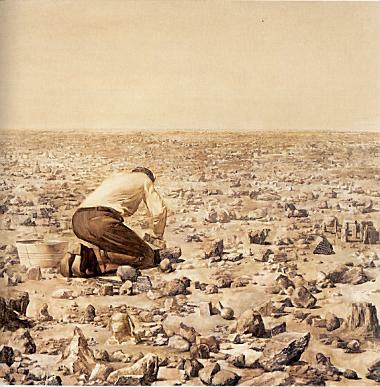
Robbe-Grillet Cleansing Every Object in Sight
Mark Tansey
1981 1 2 3 4
"The daunting desolation of Mark Tansey's image of Alain Robbe-Grillet at work, cleaning a seemingly infinite expanse of coded objects, weighs heavily."
-
Jacky Bowring
_______________________
Agnieszka's Dowry
edited by Katrina Grace Craig and Marek Lugowski
the poetry serial of A Small Garlic Press
via 3quarksdaily
Happenings
Michael Ripley
As we sleep
The graffiti bears leave their dens
Their shoulders cool as waves
Ready to roam the lawns
Hungry for discarded crayons
Careful to avoid wet cement
There will be rain tonight
Tonight the neighbourhood will tremble
As the worms wage war
With the weevils
Cracking the sidewalks
Spilling minty blood
Ravaging roots
Hiding in the garden hoses
Imitating string
Stomachs full of soil
Choking on small stones
Too full for victory
In the basement
The missing socks meet
And exchange stories of escape
Lamenting for those they left behind
Comparing scars
Singing songs of shoe brothers
Toasting to the benevolent radiators
Crying lint
In the sewers
The June bugs mend their huts
With popsicle sticks and twigs
The June bug king
In his tin can castle
Feasts on the eyes of aphids
While lady bug footmen
Gently shine his shell
And in our beds
We itch
As thirsty mites
Leap from our lashes
Into silent pools of tears
_______________________

American Daguerreotype
a young seated boy with a book
circa mid 1840's.
Once Removed:
The persistence of invented memory
Being a study of daguerreotypes, time, oblivion, and the poetics of beauty in the annihilated image
Shaun Caton
Without the pecuniary framework or cultural incentive to collect irretrievably scratched daguerreotypes the reader may find cause for considerable consternation at this seemingly bizarre enterprise. From infancy we are brainwashed to appraise an occidental notion of art and pictorial representation as either, beautiful or ugly - or more fundamentally, good and bad. In applying this banal and limiting process of appraisal to daguerreotypes we are able to make ' selective ' choices based upon an enforced and blinkered education on the condition of things. Thus, imperfection is generally regarded as unrewarding and is not acknowledged as worthy of investment unless the item in question happens to be something very ' exceptional ' such as a whole plate outdoor scene. Then, it would seem, that despite thumbprints (operator's signatures?), wipes, and scattered tarnish the image is still desirable, simply because it is big and shows an exterior landscape. Enter here the concept of rarity to embolden and ballast this hypothesis and we have what is proverbially called in the trade as a ' winner '. There is surely some irony here?(....)
So, how can one entice interest in an image that has literally given up the ghost? Can such a possibility for relating to these impaired pictures be offered as an alternative visual aesthetic to that which was originally sublime? In an abstract sense can the beholder of the ancient mirror photograph inhabit its blackened and pock marked surface with any nostalgic sense of symbiosis or synasthesia? Such a premise may appear monstrously fantastic to a body conscious society which is principally obsessed with improving outward appearance through the employment of cosmetic surgery, radical dieting programmes and a spurious addiction to the booming therapy industry. Can we attribute such obtuse and superficial value systems to inanimate objects that completely exist as mementoes outside of our own somewhat fractured time frame?...(more)
_______________________
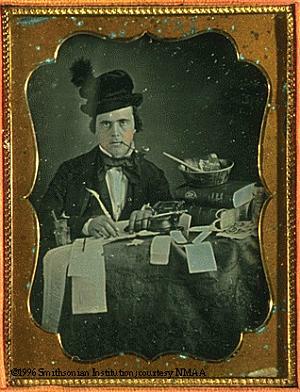 editor
Secrets of the Dark Chamber
The Art Of The American Daguerreotype
_______________________
Best in Show
American daguerreotypes at the Great Exhibition
Marcy J. Dinius
common-place
At the Great Exhibition, the different types of photography on display, including daguerreotypes, were classed as "philosophical instruments and processes," both to downplay their resemblance to painting, which had been disallowed in the exhibition as not advancing industrial knowledge, and to emphasize the knowledge of various physical sciences necessary to producing any type of photograph. The multinational jury of scientists and artists for class X—which included photography among other instruments such as telescopes, galvanic batteries, and coin weighing machines—also wanted to emphasize photography's significant scientific uses as much as, if not more than, its virtues as a medium for portraiture. Even so, the jury could not overlook the use to which the majority of the different entries were put, concluding "for daguerreotype portraits, America stands prominently forward … her works, with few exceptions, reject all accessories, present a faithful transcript of the subject and yield to none in excellence of execution." Greeley proudly trumpeted to his U.S. readers, "Our Daguerreotypists make a great show here." Even the more critical voices in the British press found in American daguerreotypy something worthy of praise beneath the pasteboard eagle. "Within the shadow of the eagle and the striped banner we find no lights too white and no shadows too dark; they dissolve, as in Nature, one into the other, in the most harmonious and truthful manner—and the result is more perfect pictures."
What made these examples of the first photographic imaging process so significant to both the exhibition's judges and the American press seeking an unimpeachable sign of both the technical and moral accomplishments of America's industry? The answers can be found in antebellum American print culture. From the daguerreotype's introduction in 1839 through the Great Exhibition, newspapers and magazines throughout the country regularly celebrated daguerreotypy as a powerful combination of art and science capable of producing images of unprecedented representational accuracy, as well as propagating American ideology.(....)
By the Great Exhibition of 1851, then, the popular press had made a thorough case for the daguerreotype's "Americanness." By insistently linking the distinctive capacities of the daguerreotype to what they sought to establish as America's exceptional values, virtues, and progress, antebellum newspapers and magazines effectively campaigned for American daguerreotypes as capturing the national character more faithfully than any other artifact of the industrial age.
There was some truth to the exceptionalism emphasized in these reports. What began as a scientific and artistic curiosity had become a full-fledged industry in the United States by midcentury. According to one estimate, by 1853, nearly three million daguerreotypes were being taken each year in the United States alone, and some seventeen thousand Americans worked as daguerreotypists or in manufacturing related to daguerreotypy to meet this demand. By the time of the Great Exhibition, the rest of the world, including France, looked to America for its daguerreian cameras and lenses, its processes and materials for coating and buffing the image plate, its chemicals for developing and fixing the image, its paints and brushes used to apply color to the silver toned images, its cases to protect and enhance the fragile pictures, and its machinery used to manufacture these various necessities. As the daguerreotypist and Photographic Art-Journal editor Henry Hunt Snelling declared in his "retrospective view of the Daguerrean art in the United States" in mid-1851, "we cannot feel otherwise than proud of the high state of perfection to which it has been brought by the American Photographist. The last five years have established the fact all over the world, that the American Daguerreotypes surpass those of all other countries, not only for the beauty of their finish but the taste of their execution."...(more)
Common-Place VOL. 09 · NO. 04 · July 2009
_______________________

View of San Francisco
California., ca. 1855
daguerrotype
_______________________
The Social Construction of the American Daguerreotype Portrait
Ben Mattison
The daguerreotype in America
Beaumont Newhall
google books
The daguerreotype: nineteenth-century technology and modern science
M. Susan Barger, William Blaine White
google books
_______________________
Traversing the electronic textbook frontier isn't easy, but it's probably logistically-and pedagogically-necessary
Closing the BooksJim Cullen common-place
It's taken about a year, but I've finally concluded that it's time for me—and, fellow teachers of U.S. history surveys, probably time for you—to do something that doesn't come naturally: give up on printed and bound textbooks. While teachers are not unique in our attachment to hard-copy publishing and cannot singlehandedly be the solution to the problems that plague the textbook industry, we are situated at a critical nexus in the chain, and it strikes me that, as a matter of social and educational responsibility, we ought to face the question of textbooks' future directly. Electronic books (a.k.a., e-books) are no panacea and have some clear drawbacks in terms of their readability (which I'll get to presently). However, we've reached a point where they merit a closer look.(....)
... my guess is that the logic of the marketplace or the school district will exert itself eventually. Printed textbooks will probably become a luxury, no matter what happens. Indeed, many college and independent-school students admit, though not directly to their teachers, that textbooks are already a luxury that they don't actually purchase.
And this brings us to what I regard as the heart of the issue: U.S. history textbooks are, at best, a crutch anyway. ...(more)
_______________________

Mandoli, Delhi, India
Sophie Gerrard
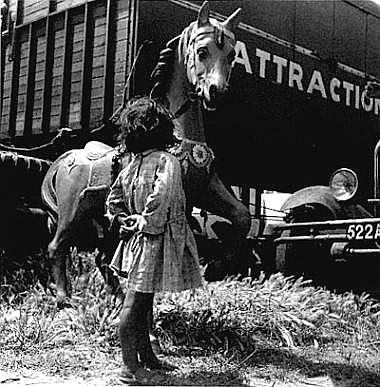
Dress for a pagan celebration
Saintes-Maries-de-la-Mer
1955
Les Gitans
Lucien Clergue
_______________________
From My Father's Books
Luan Starova
Translated from the Macedonian by Christina Kramer
In those rare moments when, bent over his opened books, he considered his fate, seeking solutions to the Balkan history of his family, in those moments when he thought he was fully prepared to begin writing the history of the Balkans through the declines of the three empires with which the life of his family had collided (Ottoman, Fascist, and Stalinist), my father began to ask himself which was his fatherland: the fatherland of his ancestors or the fatherland of his descendants.
He himself was deeply convinced, and no one and nothing could dissuade him from his belief, that his library remained his ultimate fatherland. It was filled with books in various languages, in various scripts, from various eras. Here, too, was a globe he rotated when he couldn't settle upon his homeland.
My mother was not concerned about the family's survival so long as she could see my father in the library, relaxed in his own country. If she sensed that the pages of a book were disturbed, if Father's shadow played along the walls of the room, then my mother feared that another exodus lay ahead…(....)I left the cupboard in unparalleled disarray, having destroyed, forever it seemed, my father’s ordering of time. I had likely been inside the cupboard for a long time. As I emerged, I met my mother’s frantic gaze. Rarely had I seen my mother crying. All the doors and windows of the old house were open. The crosscurrents carried my father’s papers out of the cupboard, and they flew everywhere, piling up mostly on the balcony. My mother chased after them in a frenzy, not letting a single one fly out of the house. After she had gathered them up and closed all the windows, she entered the cupboard. And what did she see there! She remained in that cupboard a whole eternity.
She put things in order as best she could, but there was no way that she could return the old order to the papers and the old books. There had been no greater upheaval in the history of our family than in those moments when what had been held most sacred was thrown into doubt. During the era in which my family lived in the Balkans there had been two world wars, civil wars, great earthquakes and epidemics, forced migrations—strong raps of fate on the doors of our family. We had also watched helplessly as those closest to us died and departed.
Neither before, nor in the years that followed, did I ever see my mother so frantic, so upset....(more)
Words Without Borders
July 2009: Memory And Lies
_______________________
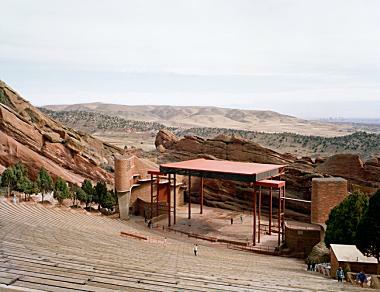
Red Rocks
2008
Mike Reinders
via The Exposure Project
_______________________
four sonnets
Camille Martin
cold windows quietly hoard iridescent ova, i write,
to begin at the brink of something that seems almost
attainable. the prospect looms distantly in cool
meditation, not about to teeter into the first
warm breath to come down the pike and call it
home. i’ve eaten the last morsel and become a stranger
to myself, as far away as orion wheeling slowing
across the sky. plate empty, i dance to conjure
melted brooks, but the unmoved sun massively
shrugs off the confabulation of my phantom
gestures. i’m already hungry for the freshly eaten feast,
but even this early in the game, i feel i must deceive
myself as once again synapses conspire to blurt out
a raucous draft of blooms.
e·ratio 12 · 2009
poetry by David Chikhladze, Gautam Verma, David Rushmer, Anne Fitzgerald, Mary Ann Sullivan, Ruth Lepson, Virginia Konchan, Sandra Huber, Paige H. Taggart, Marcia Arrieta, Sean Patrick Hill, Travis Macdonald, Mark Lamoureux, Camille Martin, Nathan Thompson, Philip Byron Oakes, Cyril Wong, and Derek Henderson
_______________________
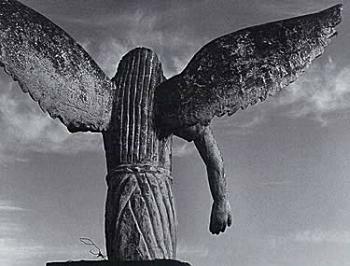
El Angel Exterminador
1991
Mariana Yampolsky
Meditations on Mexico
Mariana Yampolsky _______________________
An Auto-da-fé
Kevin McFadden
I have nothing to recant, I am just
the decanter. You, the just destroyer,
have in faith become the role, recalling
for those gathered the noble fallen
with a prayer to his-grace-above-fire,
(“Turn me, I’m burnt on that side”)
St. Lawrence. Well done, I applaud.
And you: Well executed.
This is it. Not much else to await
when our fates touch: I’ve nowhere to be
but eternity, you’ve nothing to catch
but the thatch. Dry on dry,
we keep our wits about us . . .
no one to meet but our match.
Poetry Magazine - July/August 2009
_______________________
The first man
On the North, literature and colonialism
Stefan Jonsson
Translation by Sarah Death
In this geography, the North was accorded a special place. But it was not only the Nazis of Germany who believed in this model. That same imaginative horizon still colours the image of the North that we encounter in the world about us. When the residents of the Nordic region see how they appear in the world's image of the North, it is not unusual for them to adopt it as their self-image. It is an image of the North as a region of people who, with the mentality of a people who have worked the soil for nine centuries, carry on building their ideal communities and defending them against the degeneracy and extremes both of hyper-modernity and archaic barbarism. We know how laborious that is. We also know we can rely on our own strength. Eyah – well, well, as we say here in our colony, the North.
The veracity of this image of the North is sometimes the subject of debate within the Nordic region. The debate is fruitless. The question is unanswerable. Or to be more accurate, it can be answered both in the affirmative and in the negative, depending on the degree of generalisation, or to put it bluntly, of superficiality, one is prepared to accept in one's description of cultural processes.
But rather than answering the question, we can stand back and try to see it as foreign to us. What do we see then? The narrative of the North as depicted by Hamsun and idealised in Nordic and European history seems to be the narrative of some kind of settler colonialism....(more)
_______________________
Flarf is Dionysus. Conceptual Writing is Apollo.
An introduction to the 21st Century's most controversial poetry movements.
Kenneth Goldsmith
Poetry
Start making sense. Disjunction is dead. The fragment, which ruled poetry for the past one hundred years, has left the building. Subjectivity, emotion, the body, and desire, as expressed in whole units of plain English with normative syntax, has returned. But not in ways you would imagine. This new poetry wears its sincerity on its sleeve . . . yet no one means a word of it. Come to think of it, no one’s really written a word of it. It’s been grabbed, cut, pasted, processed, machined, honed, flattened, repurposed, regurgitated, and reframed from the great mass of free-floating language out there just begging to be turned into poetry. Why atomize, shatter, and splay language into nonsensical shards when you can hoard, store, mold, squeeze, shovel, soil, scrub, package, and cram the stuff into towers of words and castles of language with a stroke of the keyboard? And what fun to wreck it: knock it down, hit delete, and start all over again. There’s a sense of gluttony, of joy, and of fun. Like kids at a touch table, we’re delighted to feel language again, to roll in it, to get our hands dirty. With so much available language, does anyone really need to write more? Instead, let’s just process what exists. Language as matter; language as material. How much did you say that paragraph weighed?...(more)
_______________________
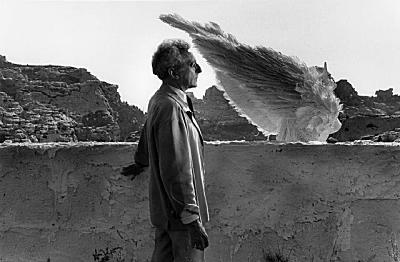
Jean Cocteau et le Sphinx
Lucien Clergue
1 2
_______________________
Fresh poetry, fiction and essays at nthposition

Lawren Harris
1926
A Canada Of Light
B. W. Powe
Happy Canada Day
_______________________
The Weather
John Newlove
1938 - 2003
From: Apology for Absence: Selected Poems 1962-1992
I'd like to live a slower life.
The weather gets in my words
and I want them dry. Line after line
writes itself on my face, not a grace
of age but wrinkled humour. I laugh
more than I should or more
than anyone should. This is good.
But guess again. Everyone leans, each
on each other. This is a life
without an image. But only
because nothing does much more
than just resemble. Do the shamans
do what they say they do, dancing?
This is epistemology.
This is guesswork, this is love,
this is giving up gorgeousness to please you,
you beautiful dead to be. God bless
the weather and the words. Any words. Any weather.
And where or whom. I'd never taken count before.
I wish I had. And then
I did. And here
the weather wrote again.
_______________________
Canadian Poetry - University of Toronto Library
Poetries of Canada
The East Village Poetry Web _______________________
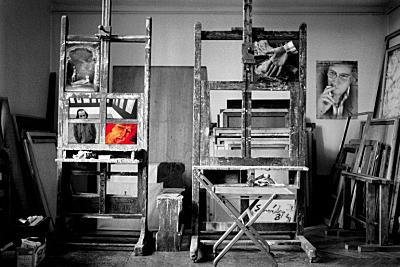
Lajos Sváby
(1990-98)
Masks
Péter Horváth Demeter Gallery _______________________
Hard, Dry Eyes and Eyes That Weep:
Vision and Ethics in Levinas and Derrida
Chloi Taylor
... as Derrida argues in "Violence and Metaphysics," the theory of vision and light as violent is but a metaphor, even if it is one of the fundamental metaphors which has shaped our history, experience, and thought, and which has served too often as an alibi for real violence. Nonetheless, I have argued that Levinas's persistent use of visual metaphors throughout his work despite his own critique of visuality shows not only that this metaphor is, as Derrida says, inescapable, but also that it can be transformed to describe other ways of seeing that we already experience. Derrida notes that there is no alternative to the metaphor of light, and certainly night and blindfolded synagogues are not such alternatives, and yet we can think of options other than the binding and blinding of eyes, and of other forms of light than the penetrating gaze of the sun. As such, we can develop new metaphors of light and seeing, moonlit metaphors of bewildered and responsive vision. One such image of vision I have developed in this essay is that of seeing tears and of seeing in tears, an image that, as seen, occurs briefly in Levinas's discussion of the sculptures of Sacha Sosno, and equally briefly in the conclusion of Derrida's Memoirs of the Blind. As Derrida concludes Memoirs, so I would like to conclude here with the suggestion that we need to believe in "these weeping eyes, those seeing tears," and in a visionary ethics....(more)
_______________________
King Gubu
King Of The Gobshites
transposition of Jarry’s Ubu to Ireland
Tom Quinn
Act One
Scene One:
(Music loud Père Ubu - the stage is surrounded with garish flesh and blood coloured images of torture and debraining). Mister Gubu dressed in a bulbous green leprechaun outfit with hat and silver buckle. On his belly an inward curving gold spiral like a living Newgrange. Missus Gubu dressed as half-Irish Colleen, half-crone. Mister Gubu is enormous and carries a shillelagh. Mister Gubu advances to the front of the stage and stares menacingly into the auditorium.
Mister Gubu - Gobshites!
Missus Gubu - Oh, would you ever whist with yur Gubu-ulations, Mister Gubu, ya big eejit ya!
Mister Gubu - Ooh! Ooh! Careful now! Don't have me to do ya in now, Missus Gubu!
Missus Gubu - It isn't me ya should be doin' in, Mister Gubu, it's another fellow altogether.
Mister Gubu - Green shite, m'dam, I don't understand a word yur saying.
Missus Gubu - Wha' then, Mister Gubu, is it contented with yurself y'are?
Mister Gubu - Shite, m'dam, of course I'm contented. And shite so I should be: captain of the cavalry, privy counsel to the good King Eamonn, decorated with the order of the Green Shamrock of Gobshiteland and ex-King of Rockall, what more could I want?
...(more)
_______________________

Clouds
Lake Superior, 1923
Lawren Harris
1885-1970
_______________________
Stone's Secret
Margaret Avison1918 - 2007
From: Sunblue
Otter-smooth boulder
lies under rolling
black river-water
stilled among frozen
hills and the still unbreathed
blizzards aloft;
silently, icily, is probed
stone's secret.
Out there --past trace
of eyes, past these
and those memorial skies
dotting back signals from
men's made mathematics (we
delineators of curves and time who are
subject to these) --
out there, inaccessible
to grammar's language the
stones curve vastnesses,
cold or candescent
in the perceived
processional of space.
The stones out there in the
violet-black are part of a
slow-motion fountain? or of a
fireworks pin-wheel?
i.e. breathed in and out as in
cosmic lungs? or
one-way as an eye looking?
What mathematicians must,
also the pert,
they will
as the dark river runs.
Word has arrived that
peace will brim up, will come
"like a river and the
glory...like a flowing stream."
So.
Some of all people will
wondering wait
until this very stone
utters.
_______________________
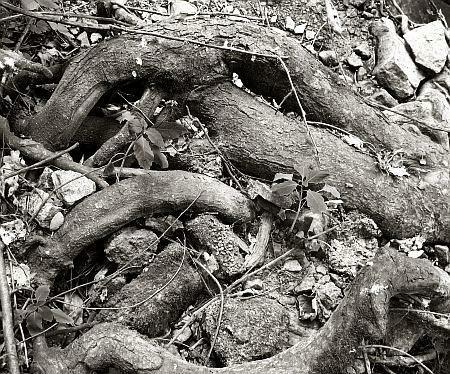
Knots
downstream
photo - mw
_______________________
W.S. Merwin with Bill Moyers
BILL MOYERS: You titled this new book, the one that just one the Pulitzer Prize, "In The Shadow of Sirius". Now, Sirius is the dog star. The most luminous star in the sky. Twenty-five times more luminous than the sun. And yet, you write about it's shadow. Something that no one has never seen. Something that's invisible to us. Help me to understand that.
W.S. MERWIN: That's the point. The shadow of Sirius is pure metaphor, pure imagination. But we live in it all the time.
BILL MOYERS: How so?
W.S. MERWIN: We are the shadow of Sirius. There is the other side of-- as we talk to each other, we see the light, and we see these faces, but we know that behind that, there's the other side, which we never know. And that — it's the dark, the unknown side that guides us, and that is part of our lives all the time. It's the mystery. That's always with us, too. And it gives the depth and dimension to the rest of it.
BILL MOYERS: But this is the first poem in the book. Would you read this for us?
W.S. MERWIN: That must be "The Nomad Flute."
You that sang to me once sing to me now
let me hear your long lifted note
survive with me
the star is fading
I can think farther than that but I forget
do you hear me
do you still hear me
does your air
remember you
o breath of morning
night song morning song
I have with me
all that I do not know
I have lost none of it
but I know better now
than to ask you
where you learned that music
where any of it came from
once there were lions in China
I will listen until the flute stops
and the light is old again
BILL MOYERS: "I have with me all that I do not know. I have lost none of it." What — how do you carry with you what you do not know?
W.S. MERWIN: We always do that. I think that poetry and the most valuable things in our lives, and in fact the next sentence, your next question to me, Bill, come out of what we don't know. They don't come out of what we do know. They come out of what we do know, but what we do know doesn't make them. The real source of them is beyond that. It's something we don't know. They arise by themselves. And that's a process that we never understand....(more)
_______________________
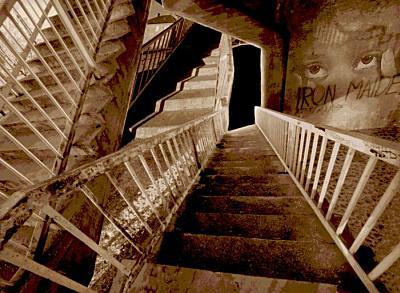
Exit
Péter Horváth
(1998)
_______________________
The Book Depository
Free delivery worldwide on all our books.
|
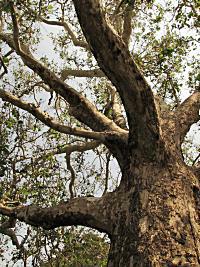
 Janus Head
Janus Head
 The Age of Briggs & Stratton
The Age of Briggs & Stratton















































